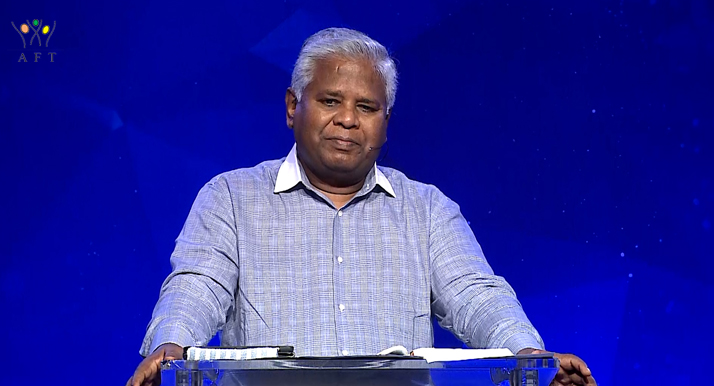
Abounding Grace (Vol. 39) – Good works Motivated by Love
Sunday English Service – 03 OCT 21
Transcript
Please turn with me to Galatians chapter 5. We’ve been teaching on abounding grace, for the last so many weeks and we’re still on the subject. The title comes from, as you know, Romans chapter 5, verse 24, where Paul says, “Where sin abounded, grace did abound much more”. What does it mean? It means that when sin came into this world, and into man’s life, it bounded in the sense that it, overpowered him, destroyed him, ruined him, and everything about him. But when the grace of God was unleashed, through Jesus Christ in our redemption, it was enough to more than make up for what was lost. The grace of God restored everything that was destroyed. And on top of that, made everything more beautiful, more wonderful, than ever before. So, “Where sin abounded, grace did much more abound,” Paul says. So, we’re talking about that grace, and how that grace works in our lives, in reconstructing our lives, according to God’s plan and purposes. All right.
Now, in this, we’ve been dealing with a particular question, a big question that people ask oftentimes, us preachers. The question is this. They say, “Well, you guys teach grace. And teaching grace means that you are saying that once you believe in Christ, and receive Him as your Lord and Saviour, no matter what you are, and what you’ve done, your sins can never bring you into condemnation. And you are children of God, blessed. And that can never be revoked, you will never be disqualified. This is what grace means.” But they say if that is true, if grace means that there is now therefore no condemnation to them, which are in Christ, that we will never again face condemnation, we will never again be disqualified, that God has given us all favour, bestowed upon us every good thing. If that is what it means, then it takes away all incentive for holiness, for good life, and a good living, and all of that. Because now, you have everything; you have everything from God; God’s favour is upon you, it can never be revoked, you can never be disqualified. Therefore, it doesn’t matter if you are found lacking in some areas of your life, if you’re found to be wanting, if you have certain flaws and sins and things that come in the way. It doesn’t matter, it means. So, that disturbs a lot of people. They say, “Well, if you say, regardless of your sin, regardless of your perfection, God will receive you and work with you and show His grace to you. Then, that means that people will lose all incentive for a Holy life. There is nothing there to demand from them a Holy life. Instead of preaching grace, if you preached the laws of God and warned them and told them, that if they don’t obey the laws of God, they are going to be disqualified. God’s favour is going to be withdrawn, and they’re going to find themselves in hell and so on. Then they have an incentive for Holy living.” So, this is the question that people ask. “Your ‘grace’ teaching takes away the incentive for Holy living,” they say. It’s a big question in the minds of people.
Now, I’m going to answer that question. And I’m going to show you how the Gospel of salvation, through the free grace of God and not works, is actually a greater incentive to a life of honesty, life of sacrifice, life of love, a life of holiness, than anything else; than anything else. We started looking at it last week. I began to show you that last week, but we will continue that. But let’s talk about how important this subject is. You know, Paul is writing to the Galatians. You know, he started the churches in Galicia, which is an area that comes right now, in the country that we call ‘Turkey’ today. He has established churches in several cities there. And as soon as he finished establishing them and came away to Antioch, others went there to the same churches, and started preaching, legalism; started preaching, saying, “Well, you have received Jesus as your Lord, but you also have to be circumcised. You also have to follow the law.” See, Paul, went there preaching, saying that you believe in Jesus Christ, you receive the forgiveness of sins, you receive a new life, you get saved, and as a result, you live a good holy life. So, receive Jesus, get saved, live a holy life as a result. That’s Paul’s teaching.
These people went there behind them and said, to those very same people, “No, he was wrong. He doesn’t know much, because he came later, as an Apostle. He’s a man who joined us later. We come from the Apostles, that the original Apostles,” and they know better; they have been with Jesus. It’s important to believe in Jesus. You believe in Jesus but next comes the good works. Good works are necessary, and among them, the good works of the law, keeping the law and keeping such things as the circumcision and so on. And then, that will lead you to salvation. Instead of receiving Christ, then receiving salvation, then leading to good life. They’re saying, receive Christ, add good words to it, then only you will receive salvation. Otherwise, salvation itself is impossible. Now, this is a teaching that is totally against what Paul has been teaching. So, Paul is dealing with that situation. And in the process of dealing with that, he answers this question, because one of the questions in their mind is this question that I put before you, that if you say we are saved by grace, and the good works are not going to qualify as anymore. We do good works for some other reason, not to qualify and not to find favour with God but for some other reason, we do good words. Now, as a result of our salvation, as a result of this new life, we start doing good work. If you say that, then that means there is no condemnation, and if there is no condemnation, that takes away the incentive for holy living. That’s the question, all right.
Now, how important this subject is, is very crucial. How important is this subject? Now, the key is in verse 6. If you read verse 6 of Galatians, chapter 5, that’s the key: For in Christ Jesus neither circumcision nor uncircumcision has any value. See, they’re fighting about circumcision or non-circumcision. Some people saying, “Yeah, circumcision is necessary.” Some others are saying, “No, circumcision is not necessary.” This is the controversy going on. And Paul is making a statement here, tremendous statement, he says, “In Christ Jesus, neither circumcision nor uncircumcision has any value.” You can get circumcised if you want; you don’t get circumcised if you don’t want. It has no value. A circumcised person is not very specially qualified for any blessing of God; an uncircumcised person is not disqualified from any blessing of God. The only thing that counts—the rest of the verse says—the only thing that counts is faith, expressing itself through love. I like that. The only thing that counts is faith expressing through love. I would say, I will put it like this: Christian life, in essence is a life of faith that is motivated by love. That is what Paul is trying to say. You’re saying there will be no incentive for holiness, there will be no desire and need to live a holy life. If you say there is no condemnation to them, which are in Christ Jesus now. But Paul says, “No, no, there is an incentive; there is a greater incentive, in fact. And that incentive comes from the love that flows in one’s heart as a result of salvation.” So, motivated by love, good works flow from that life. And that is what Christian life is all about. That is what Christian life is all about. Now, that’s what we’re going to see. We’re going to see that the Gospel of salvation, through the free grace and not works, is actually a greater incentive to a life of honesty, life of sacrifice, a life of love and a life of holiness, than anything else. All right.
Now, how important this? Let me tell you that this is important not only for Christians, but also for people in the world because this question is a very relevant question, that is in the minds of very highly educated, very qualified people that want to do some good today in the world. For example, there was a woman, named Beatrice Webb, who was also named, ‘Lady Passfield,’ back at the end of the 19th century, in the beginning of the 20th century. She and her husband, Sidney, lived in Britain, and they are considered the founders of the social welfare structure of Britain. Social welfare structure dealt with such things as how to provide a proper earning for those people that do not have enough earning, and how to make up for the gap between poverty line and sufficiency and, how to provide healthcare, how to provide education for all and, and that kind of thing, and how to provide medical care, and so on. So, they were working on that. They’re very intelligent people. And they decided, even though they were raised in the church, and were Christians, they decided at one point to renounce Christianity. They felt that the claims of Christianity are not worth believing in, so they renounce Christianity. But near the end of her life, this ‘Lady Passfield,’ or this, Beatrice Webb, wrote an essay in her diary that has become famous now and a lot of people quote it.
In her diary, she said, “I’ve staked everything on the essential goodness of human nature.” She believed in the human nature, you see, the goodness of the human nature. She believed that all people are good and these good people need some help. So, if you just provide us a medical care, some education, took care of some of their needs, made up for their income that they’re lacking, and dealt with the social welfare problems and dealt with it satisfactorily, everything is going to be fine, because people are basically good. All the evils that you find are because we don’t have enough. People are lacking in so many areas, that’s why they resort to all kinds of evil things. So, she believed in the goodness that was in people. And 35 years later, she realized this. She says, “But now 35 years later”, she says, “I realize how permanent are the evil impulses and instincts in man and how little we can change these. For example, the greed of wealth and of power.” She found out that the evil impulses and instincts of man cannot be changed much. “How very little we can change it, I realized,” she says, “After a long time. For example, the greed of wealth and power. We must continually be asking for better things from our own, and from other persons, with respect to human nature. But shall we get any response? Without a response, how can we shift social institutions from off the basis of brutal struggle for existence and power, and onto that a fellowship?” Then she says, “Finally, no amount of knowledge or science will be of any avail unless we can curb these evil impulses and set free ourselves for good. Can this be done?” she says, “Without the authoritative ethics associated with faith, and a spirit of love at work, in the universe.” Very interesting.
For one thing, she says, “After 35 years, I found out that the evil impulses or instincts in man cannot be changed very much. They remain the same. You cannot do anything except expect anything better from man. No amount of knowledge or science will be of any avail unless we can curb these evil impulses, unless we can control these evil impulses in the heart of man, we cannot be free to do good,” she says. Then, she asked the ultimate question, but she puts it in non-religious terms, because she now does not believe in God or Christianity. So, she puts it in general terms, she says, “Can this be done?” Instead of saying, “Can this be done without God? A faith in God?” She says, “Can this be done without the authoritative ethics associated with faith and a spirit of love at work in the universe?” A very secular way of putting it. “Authoritative ethics” is something like the 10 Commandments; something that said very clearly, what is right and what is wrong, that can be accepted by anyone. We went and told about what is right and what is wrong; people should be able to accept it, saying, “All right. I agree with that. That sounds good,” you know. But people say, “Well, we don’t want to believe the Bible; we don’t want to believe other Scriptures; we don’t want to believe anything. We don’t want to believe in God; we don’t want God.” So, there is no source for authoritative ethics. And the authoritative ethics alone cannot help because telling them what is good and what is evil, is not enough. You’ve got to empower them, to do what is good and that requires an association with faith. These authoritative ethics must be associated with faith, and a spirit of love, at work in the universe.
So, the lady has come to some very solid conclusions. She staked everything on the goodness of human nature, so, she set up things so that education, social welfare, and all of these things, can be provided so that people can respond in fellowship. But in the end, she only finally came to realize that evil impulses in human beings, a desire for power. See, the evil impulses, by “evil impulses,” she means “a desire for power,” she says. “That leads to pride when power is given. And then, that leads to selfishness, then that leads to violence to attain whatever they want to attain. Whatever they desire. And we can’t stop it,” she says. That’s the sad thing. We find no way to stop it. “How in the world are we going to have a world?” she says. We keep asking people and they won’t respond? How are we going to live in this society? How are we going to live or have a world? That question, if we put it in biblical terms as this: unless there is a God, is there any hope? Is what she’s saying? How can this be done without the authoritative ethics associated with faith and a spirit of love at work in the universe? In other words, let me put it in another way. How in the world are you going to deal with a human heart that is so evil? How can you change the human heart so that there is a desire to love and to sacrifice and to be generous? And to be kind? How can you turn an evil heart into a good heart? That’s the question.
Now, in countries like America, you know, you see certain kinds of crimes are on the rise and it’s astonishing how, even little kids in school—10–12-year-old kids—end up bringing guns to the school and end up shooting kids and teachers, and so on. It has happened in some places, and I’m sure you’ve read the reports of that. And as soon as something like that is reported, you should see the response, in the social media days. People immediately start responding. There’s some people say, “Well, we must ban all guns,” you know. “Gun control is the answer.” And then, there are others shouting, “No, no, no, it is my right to have guns!” You know. And so, they’re fighting among themselves, you know, and arguing about themselves, you know, about gun control, and so on. They think that’s the answer for this problem. If you didn’t give them guns, if you didn’t have access to guns, then there won’t be problems, they think. Then, there are others who say the TV is the problem. Look at the violence that is there on television. It’s because of the violence, we have these problems; people want to see it. People see what is happening on television, on movies, and so on, and then, they want to reproduce it in real life. And so, people look at these things this way, but they refuse to acknowledge this one thing, that this has been happening for centuries before there was ever a gun, for centuries before movies were ever made. This has been happening for hundreds and hundreds of years; this has been happening. Evil, you can trace it all the way back to a little bit after the beginning. Evil has been there. What is the answer?
People are suggesting, people say, “Well, to save yourself, to protect yourself from this, you need to go and live in a very decent area, so that this kind of people will not be coming in there. And these kinds of problems you will not have in those areas.” But they’re finding out now that even in those areas, kids do things like this. And even adults end up doing things like this. Because the problem is in the human heart. Evil is something they think we can control, you know, but it turns out that it’s too deep. It’s in the heart. It’s even in the child. And we think these kids are innocent, but evil is there even in the child. The child would bring a gun and shoot somebody. Look at the kind of evil that’s in the heart. Some hatred, some anger, some frustration, is filling the child. So, the important question, to all of them is this question concerning human evil, which is there, even in the mind and in the heart of a child. And to them, it is something silly that they don’t know how to deal with these issues. Even though the technology has gone advanced, and science has advanced, knowledge is advanced, they still don’t know the answer to these problems. They don’t know the answer to the problems because it’s a spiritual problem. That is why I believe the church and the Bible preaching is something that deals with these problems that the world does not know anything about. It speaks about these problems, whether anyone receives it or not. The Bible is an answer book concerning the spiritual problems that people are not able to understand. The answer is not to gun control, the answer is not censorship of movies, the answer is not more social welfare, and so on. The answer is, we must deal with the heart; there must be someone that is able to change the hearts of people and turn the hearts into a good heart.
Now, what does the Bible say about this problem? That’s what we’re dealing with today. What does the Bible say about this problem? Paul is basically saying that the thing that happens in Christian life is the heart is changed. That’s the key to Christianity. The key thing that happens in Christianity is that it’s not just a religion, where you go and join and follow its teachings and so on. It is where you come and believe in Jesus Christ and as a result, your heart is changed. And when your heart is changed, the reason you do things, change. That’s the thing. The reason you do things, change. And we’ve been talking about why people do good works, you know. The difference between those that taught legalistic teaching, opposed to Paul, and what Paul taught, as a grace teacher – what is the difference between them? Did Paul teach saying that you don’t need to obey the law? No, he also said you need to obey the law. Did they—the legalistic teachers—did they neglect grace, totally? No. They also said, “You believe in the Lord, Jesus Christ and the grace that is given to you.” Both of them were teaching grace, both of them were teaching the law and saying that it must be obeyed. Then what is the difference? The difference, I pointed out to you last week, the difference is in the reason why they say you must obey the law. The reason is very different. The legalistic teachers that were disturbing the churches in Galicia because of which Paul is writing this Galatian letter to deal with that difficulty. Now, those Galatians are asking the question, you know. They’re asking the question, they’re saying, “Well, how is it that belief in Christ alone is enough? We need to produce good works that will qualify us for salvation. These people are right,” they think. And Paul is answering that question and dealing with that question.
And Paul is saying, “No, I’m not saying that the law is not necessary, that you don’t have to keep the law. The reason that we are giving is different from the reason that they are giving.” What is the reason that they are giving? They are saying that you need Jesus, plus the observance of the law, plus circumcision. Jesus, plus something, always. But Paul is saying, “It is Jesus, plus nothing! It is Jesus and Jesus alone, and by the grace of Jesus alone are you saved. And as a result, good works are produced out of that life.’ The reason you do good works as a Christian, is because you have a changed heart, and therefore, the love of God is constraining you and you’re doing good works as a result of love. The motivation is love. And so, we’re going to talk about three things about this motivation – this new motivation that Paul is talking about. What is the new motivation for good words? This is where the problem is. They’re teaching that good works are necessary, but their motivation is different. Their motivation is that you must receive acceptance from God; you must become qualified by good works. That’s a wrong motive.
Paul is teaching a new motive, that they know nothing about. And that is, Paul is teaching, that love is the new motive. So, we’re going to say three things about this new motive. One is, we’re going to point out how this different motivation for obedience is very crucial. How important this is, this different motivation. Secondly, we’re going to talk about what this new motivation is, that it’s love. And I want to show you, logically, why that is so. Thirdly, I’m going to show you how this new motivation works. First, how crucial this new motivation is. Secondly, what this new motivation is. Thirdly, how this new motivation works. Let’s go at it, in the remaining time that we have.
First of all, the new motivation is crucial. Look at verse 7 and 8, let me read to you, verse 7 and 8 of Galatians, chapter 5. You were running a good race. Who cut in on you to keep you from obeying the truth? That kind of persuasion does not come from the one who calls you. Now, look at what he’s saying. He’s not saying, “Well, now that you’ve accepted Christ, you don’t have to obey.” He’s saying, “You have to obey.” He is, in fact, asking, “Who cut in on you to keep you from obeying the truth?” So, he’s not telling them not to obey. He says, “Who is disturbing you in such a way that you end up not obeying the truth, not being able to obey the truth?” And the thing is this: the Galatians were thinking that they were going to now begin to obey the laws of God, which they have not been doing so far. They have not been circumcising, and they have not been obeying the Jewish laws, and so on. Now, they’re going to really, strictly, obey these things and really follow these things. And Paul comes to them and asks a very weird question, really. They think they’re now going to obey, more than ever, the laws of God and he’s saying, “Who cut in on you, to keep you from obeying the truth?” All right. It’s very interesting, he uses the word “truth,” instead of the “law.” What he means is, who cut in on you to keep you from obeying the law, really. But he says, “Who cut in on you to keep you from obeying the truth?” Why does he use the word “truth” instead of the “law”? The reason is this.
You see, when people obey the law, for wrong reasons, they’re simply obeying the law but not the truth. See, the laws have a truth behind it. Truth is the thing that makes the law very valuable. For example, in our homes, we have law, right? We lay the law down for our children, and so on. There are things that they can do, they cannot do and so on. There’s a rule, in every home, there are some rules. Now, and in schools and colleges, they have rules. Every organization has the rules, but do you know some people hate these rules, but they obey the rules because if you don’t obey, you’re taken off from the job, you’re dismissed from the school and so on. You cannot live in that home, disobeying the law. So, they obey the law, but obey it with a grudge in their heart. They obey it for the sake of obeying it, they obey it for the sake of getting along in that situation, but do not obey it for the benefit that it gives, and for knowing they don’t obey it, knowing what it is there for, you see. They simply obey it because it demands it. And they have to do it. And there is no other way.
Now, Paul is saying here, that if you’re doing it like that, then you’re not obeying the law at all. If you’re obeying the law for a wrong reason, then you’re not obeying the law at all, because you’re obeying the law, but you’re not obeying the truth. You’re obeying the commandment, but you’re not obeying the truth, the truth behind that law. Every law has a truth behind it, in the homes or schools and colleges. Wherever they have the law, they have some reason behind that law. That’s the truth. The law is beneficial in some way. It brings some real benefits to the person that needs to obey that law. And when a person grudgingly obeys the law, that means he does not understand the truth, he does not benefit from it, he does not obey that truth, he just obeys the law. And that is equal to not obeying the law. That is what Paul is saying. That is why he says, “Who cut in on you to keep you from obeying the truth?” He says, “You are now, by listening to these guys, these realistic guys that come and teach you, you are now going to end up in a position where you are not going to obey the truth. You’re just going to go by the law, you’re going to go by the rules and obey the rules, not understanding the truth at all, you see. So, that amounts to disobedience. If you obey it grudgingly, that amounts to disobedience.
I’ll go even further. He’s saying, “If you think you’re obeying the law, if you think by obeying the law, you can win God’s favour. What you’re actually doing is disobeying the law.” That I said already. But you may ask, in what sense are you disobeying the law? I’m obeying the law. You’re saying, “No, you’re not obeying the truth, you’re just obeying the law.” In what sense am I disobeying the law? I’ve done what the law says. In what sense have I disobeyed the law? Just because I have a grudge in my heart, I don’t like the law. Does it mean that I’ve disobeyed the law? No, I have obeyed the law. In what sense have I disobeyed the law?” he says. My answer is: you have disobeyed the law in the sense that you are not listening to the law at all. You are not understanding what the law says. For example, Jesus said in the Sermon on the Mount, “You have heard it said, ‘Thou shalt not commit adultery.’” Right? They say, “Yeah, yeah, we heard it, we heard it. Yeah, yeah, yeah, it fell on our ears. It said, ‘Thou shalt not commit adultery’”. But Jesus says, “But I said to you” … Now hear what you’re supposed to hear when you hear, “Thou shalt not commit adultery.” Let me tell you what you’re supposed to hear, what must fall on your ears. “If a man looks at a woman with a lustful eye, he has already committed adultery with her.” Did you hear it? They have not heard that. They have heard. “Have you committed adultery? Thou shalt not commit adultery.” They’ve heard it. And they said, “No, no, no, I’ve never done it.” He says, “No, no, you haven’t even heard the law.” You’ve never even heard the truth. There’s a great big truth behind it. The truth is that adultery starts with thoughts. Adultery starts with lust; adultery starts with something like that. And you have to deal with that in order to obey the law.
Similarly, with murder, “Thou shalt not murder.” They say, “Yeah, we’ve heard it,” or they have not heard it. If they truly heard it, they would have heard, “You should not be angry with your brother. You should not call him a fool.” You see, because that is like murdering, that is where the murder begins, that hatred, those words that later lead to murder, you see. A lot of people, you’ve seen, another good example is the ‘Golden Rule.’ You know, that comes at the end of Sermon on the Mount: Do unto others what you will have them do unto you. This is a famous rule, everybody, Christian or not, everybody knows it. Golden Rule. So, people say things like this, they say, “Well, look, I don’t need this, Jesus; I don’t need this Cross; I don’t need Him to die for me to save me and all of that.” Why? I don’t need all of that. Because the Golden Rule is enough for me. I live by the Golden Rule. I have only one rule and I go by it. What is the Golden Rule? Do unto others, what you will have them do unto you. Treat others just like you would want them to treat you. That’s the essence. So, they say, “I do that; I follow that.” And I say to you, based on what I’ve just said about not hearing the law at all, I say that you have not heard the law at all. You have not heard what the Golden Rule is saying. When you hear the Golden Rule say, “Do unto others, what you will have them do unto you.” You think you’ve heard it, that is why you’re saying, “I’ll do it; I’m going to follow that now. I’m going to take it as my life’s dictum and follow it.” But if you really heard it, you will be shattering from head to toe because what it is really saying is, it is saying, first of all, “Have you ever seen anybody do it, perfectly?” And you know; you know, in your conscience, you know, there is not one person in the entire world that has ever, ever fulfilled this law? Never? Well, they may have tried, and they may think that they’ve come close, but nobody has ever even come close. No one has ever fulfilled this law. No one has ever been able to act in line with that law. No one has done it. And next thing it is saying is, you cannot do it. That’s what it’s saying. Nobody has done it; you cannot do it. And the third thing it is saying is, “Therefore, you need a Saviour to save you from this wretched condition of not being able to do truly good things, truly good works. You’re not able to truly act in a good way. That’s your problem.” What is the answer? You need a Saviour; you need somebody to save you from that condition.
When people say glibly, “Yeah, I know the Golden Rule, and I will follow the Golden Rule, and I am going to do it from tomorrow, onwards.” That means they have never heard it. They’ve never heard what they’re supposed to hear. They have heard the law but they did not hear the truth. Motivation is the key, you see. Motivation of the heart is the key to understanding change in people. A lot of people don’t understand the change that has happened in people. Suppose a guy that’s been a big criminal and been in jail for the crimes he had committed. And then he comes into contact with Jesus, and he gives his life to Jesus. And he’s saved and completely transformed. I’ve met people like that, wonderful testimonies. And then he comes out and lives for God, a totally transformed, radically changed life. And you see and say, “Wow, what a big difference,” because you see the difference on the outside. But take, for example, a person that has been raised in a decent family, even in a decent Christian family, where he has basically been an obedient person, basically, being a decent person, basically did not come at all those things that the law talks about – if you understand it in superficial terms. And he has been thinking that he is a moral, good person all the time. But one day, he comes into a revelation about his inner life. He really sees his sin. He really sees the law as he’s supposed to see. Like we quoted just now from Jesus’s interpretation about adultery, and about murder and all that. He hears what he’s supposed to hear in those laws. And he says, “Wow, I didn’t know that. According to this, I’m a sinner. My heart is evil. There is evil in my heart. I’ve never done it, but the evil is in my heart. I’ve never done but the lust is in my heart. I’ve never murdered but the murder is in my heart.” So, he is convicted of his sin therefore he returns to Christ. He has kept away from adultery, kept away from murder, kept away from all these other things that you’re not supposed to do. But he’s kept away for wrong reason. What reason did he keep away from those things? Because if he had shame from society if you, he feared God, that God may disqualify him, God may not give him any favour, give him any blessing, not admit him into heaven. All these reasons are there. For that reason, he’s been obeying these laws as much as he knew it. But now he really reads into the law and hears it as he’s supposed to hear and decides that he is a sinner. That’s the way Paul realizes in Romans chapter 7. He realizes all of a sudden, the thing that he wants to do, he’s not able to do. The thing that he does not want to do, he ends up doing. He says, “I know why. There is sin in me; that’s the problem. I’m a sinner,” he says. Then he cries out saying, “What a wretched man I am! Who can deliver me from this body of sin?” Then he says, “Thanks be to God, through the Lord Jesus Christ, because Jesus Christ is the One that delivers.”
So, this person, the decent, good person, who has lived a seemingly, morally good life, outwardly good life, now comes into conviction and turns his life into Christ and receives salvation. Now, outwardly, you don’t see many changes in that person, because he’s never been doing those things, outwardly. But inwardly, something has happened, right? Inwardly, something strong has happened inside of him. The change has happened on the inside. Now, he’s still keeping away from murdering, keeping away from adultery, keeping away from false witnesses, keeping away from lusting, he’s keeping away from all these other things, right? He’s still seemingly obeying the laws. But the reason he’s obeying the law now, is different. That is what makes him a Christian. The reason he’s obeying the law now is because he has now come to Christ. He realized the sin, he realized his unworthiness, he’s realized the evil that is in him. And he cried out to God and asked for help and he found that Jesus is the Saviour. He realized that Jesus took his sin, took the curse, took the punishment on his behalf, and set him free from his sin and given him forgiveness of sins. Therefore, His heart is filled with thanksgiving because of God’s grace. And now, when he lives his life, the Christian life, it is faith, working through love, or a life of faith, live by the motivation of love.
So, the key is the heart change. The key is, why you do the things that you do and why you don’t do the things that you don’t do. What is the motivation for the legalists? The motivation is fear. The motivation is that you all try to get something from God, get a blessing from God, get a favour from God, find qualification with God, find worthiness before God. Those are the reasons, the legalists do it; the legalists have taught them to do it. But Paul’s grace teaching has taught that true Christians who put their faith in Christ, do what the law says, not because they want to find favour, not because they want to find some kind of a qualification before God, worthiness before God. All that, they’ve already got fully and completely; there is nothing more to get. They’re obeying the laws of God because out of love for God, who gave Himself for them, took their punishment on Himself and died on the Cross and delivered them from their sin. All right.
Look at verse 9 and 10. “A little yeast works through the whole batch of dough.” I am confident in the Lord that you will take no other view. The one who is throwing you into confusion, whoever that may be, will have to pay the penalty. He’s talking about yeast that works through the whole batch of dough. He’s talking about this doctrine, how, when it enters into the people in the church, it will destroy the whole church. When one person gets it, it spreads and goes into everybody. This legalism, this idea of why we obey the laws; this idea that only through that, you find acceptance with God; only through that, you can find the blessing; only through that, you can find favour; only through that, you can be pleasing to God and so on, all of that. And because of that, that the wrong reason and “that is like a yeast,” he says. A little bit of that, when it enters the church, when a few people in the church, get this idea, and entertain this idea, hear it somewhere and bring it in, and spread it around and live their life, their Christian life in that way, thinking that it’s their goodness, their following the law, their keeping the commandments; that’s the thing that’s qualifying them, getting them the blessings and so on. When they portray that kind of Christian life, it’s dangerous because it’s going to spread and take over the whole congregation! That’s what he’s saying. Paul is saying, “The one who’s throwing you into the confusion.” – what kind of confusion they’ve thrown them into. He’s pointing to some person; we don’t know who that person is; he knows that person. He says, “The one who’s throwing you into confusion, whoever that may be, will have to pay the penalty,” he says. This is such a big wrong that is done. It’s like a cancer, it spreads, it takes over. It can spread and destroy the churches. That’s what he’s saying.
Secondly, what is the new motivation? The new motivation is love. Let me explain it like this. First of all, the Gospel, the true Gospel, the Gospel of grace, starts with an offense. It is offensive in many ways. Later on in the sixth chapter, Paul talks about the offense of the Gospel. Why is it an offense? You see, the Gospel, the true Gospel, when you preach it, it is offensive on the outside, because it says that God had to send His Son, because there is no one in the whole world to save people. There is no saviour available, there is not one good enough to die for others. There is not one good enough to save others. There is no one that is good enough to do anything for others; everyone is in sin. It’s like all of them are sinking in the miry clay of sin. Someone who’s outside the realm of sin has to come and pull them out. They cannot help each other. If they try to help each other, they will go in faster than ever. That’s the problem. So, when you preach the Gospel like this, why Jesus came, you have to start with why God’s Son had to come, born of a virgin, in Bethlehem. Why do He have to come like that? Why? What was the necessity and you say there is no saviour, no one that could save, only God’s Son could be the Saviour, because He’s the only One that stands outside the realm of sin? He has no sin in Him. That itself is offensive to people. They say, “What do you mean? Do you mean we’re all sinners? Don’t you know I’m better than most people in my street, you know? I’m more moral than most people in my town.” That’s the way people look at it. They are talking in human terms comparing themselves with others. But you are talking about how you stand before God here.
The Bible says, “All have sinned and come short of the glory of God.” So, that itself is offensive and then you say that Jesus had to die on the Cross. “Why did He have to die on the Cross?” they say. You say that He had to die on the Cross because He had to take the punishment of the sin, your sin, and my sin, upon Himself. So, the punishment is sin; the soul that sins shall die; the wages of sin is death. He had to take that punishment and suffer the punishment. Without that, God cannot do justice. God cannot overlook sin. He’s a righteous God; He’s got to punish sin and without that, He cannot save. So, instead of punishing us and killing us, which would mean that we cannot have salvation, if we die. He sent His Son and punished Him and then raised Him from the dead! Death could not hold Him. That’s the way He dealt with it; that itself is again saying that He is the only One that is qualified to do that. And He did that. He took our sin, He took our shame, He took our curse, He took our punishment and died on the Cross. That is demeaning to people. They say, “You mean to say that I can’t save myself? Don’t you know how educated I am? Don’t you know how decent I am? Don’t you know how qualified I am? You mean to say, I cannot do anything to save myself?” Gospel is highly offensive on the outside; the true Gospel of grace comes out as an offense.
But inside it provides great peace. Inside it’s very positive and affirmative. Why? Because when you admit that you’re a sinner, when you admit that you need the Saviour, when you admit to that you can’t save yourself, when you put your faith in Jesus and open your heart to Jesus as your Lord and Saviour, what happens? He comes in. There is now, therefore, no condemnation. Now you can go to sleep, now you can enter into your rest, now you can stop worrying about whether God loves you or not. Well, now you can stop wondering whether your prayers are heard. Now you can stop wondering whether God loves you or not, because you know that He loves you. He has washed you, cleansed you, accepted you, saved you, given you His righteousness! See inside, it’s wonderful; outside is offensive. The Gospel of legalism, the way they preached – Paul’s opposers preached – is exactly the opposite. It is very uplifting on the outside, because it says, “Do unto others what you wish for them to do to you.” People hear that and say, “Oh, that’s wonderful, wonderful, wonderful. That sounds so great. I’m going to start tomorrow with a new life. I’m going to do unto others what I wish others would do to me. I’m going to be kind, I’m going to be good, I’m going to be extraordinarily gracious from tomorrow.” And now they have a project going, you see. They think they’re so good, they can do it. So, they feel very good about themselves; it’s uplifting to them. They feel good. That kind of Gospel, when you preach, people will sit up and say, “Alright, we’ll start tomorrow. I’m not so mad. Already I’m halfway through, but I’ll do the rest of it and I’ll make sure that I fulfill this law and qualify.” That makes people good because they can do something for their salvation. It doesn’t put them down. It doesn’t tell them they’re sinners. It tells them they can do something for their salvation. That’s what legalism, or that’s the flaw of legalism. Outside, it’s comforting; outside, it suits them. But inside, it brings great trouble. Because now, they believe that by their works they can save themselves. They can qualify themselves; they can find themselves worthy before God. Now, they go and make the effort; the more they try, the more they fail.
It’s like trying to climb a greasy pole, you know. I saw, in one place, in a country where they were having an exhibition, they had a greasy steel pole about 35/30 feet high, smeared with grease. And a man standing there with a $100 bill showing and saying, “If anybody can climb up and get that flag that is flying on top, I’ll give you $100, but you’ve got to pay $5 to claim it. If you reach there, and get it, you get $100.” I stood there and watched for a long time. No one ever made it, because it is made in such a way that no one makes it. You try to climb, the more you climb, the more you try it, the greater is your failure. You get grease all over your body, and you fall inside grease and the slush that is around the pool. And your condition becomes worse as the time goes by. But yet, so many young people, in their eagerness to try, they tried. None of them succeeded. So, it frustrates people, when they take it and go home and say, “I’m going to do and I’m going to qualify and I’m going to be my best,” and so on. In the end, they find that nothing can qualify them. Their utter failure, their failure, their inability, shakes them at the roots. They feel hopeless, they feel unhappy, they feel frustrated. So, that is the legalism preaching; that’s what it does. That’s why you find a lot of Christian people in that condition.
On the outside, it’s noble, but on the inside, it creates a lot of trouble. But the Gospel of grace, on the outside, it’s offensive but on the inside, it provides great peace. Because once you receive Jesus as Lord and Saviour, your heart changes. And as a result of the heart change, something happens inside of you. And what happens is mentioned here in verse 5. Galatians chapter 5, verse 5; we dealt with it last week, so I’ll just mentioned it. For through the Spirit, we eagerly await by faith the righteousness for which we hope. We eagerly await by faith, the righteousness for which we hope. Now, hope is a word that has changed its connotation in our time. Today, when you say you hope you will get your salary this month, that means, you’re uncertain whether you will get it. You may not get it; there is a possibility of not getting it. That’s what it means. It denotes uncertainty. But in the New Testament times, when the New Testament was written, hope meant absolute certainty. So, when Paul says, “Through the Spirit we eagerly await by faith the righteousness for which we hope.” He’s not talking about that we’re hoping that in the end will be found righteous by God. No! He’s saying we already have the righteousness of Jesus given to us. We are clothed with His righteousness. God sees us as the righteousness of Christ, the righteousness of God in Christ, that’s the way God looks at us. One day, when we stand before Him, we’ll be still totally accepted just as we are accepted today. We know because we are accepted today. We believe that we are accepted today, we know that He hears our prayer, we know that we have His favour, we know that we have no condemnation. That makes us very sure of our future also. When we stand before our God, we’re going to shine brilliantly before Him, because of the righteousness of Jesus that is in us. We wait by faith the righteousness for which we hope. We are certain of that righteousness. But look at how it says, “Through the Spirit we eagerly wait.” Why through the Spirit?
Now, the Spirit plays an important role in chapter 4 of Galatians. In Galatians chapter 4, in verse 4, we read. But when the fullness of the time had come, God sent forth His Son, born of a woman, born under the law… For what? To redeem those who were under the law, that we might receive the adoption as sons. So, God sent His Son so that we might become sons of God. Right? But it doesn’t stop there. Next verse says, And because you are sons, God has sent forth the Spirit of His Son into your hearts, crying out, “Abba, Father!” Now, God could have left it at that. We have become sons; God sent His Son, provided the redemption on the Cross. We have become sons, everything is fine. He could have left it at that. But He wants us to know that we are sons. So, he sends the Spirit and what the Spirit does is, He causes us to reach out to God, crying “Abba, Father!”
Now, the best illustration is what Pastor Jeevan gave some time ago in church, in a Sunday morning preaching. A child is with the father, the child knows that he is the son and he knows that this is his father, the father loves him, and so on. He’s assured that he is the son; he knows it very well. But there are times when the father picks up that little kid and hugs that little kid, gives him a real tight hug and kisses him several times. That would assure that kid, beyond any doubt, and affirm the fact that he is indeed the son, and that his father loves him immensely. Right. That’s what the Holy Spirit does to us. God sent His Son, redeemed us, gave us sonship. But we, through the Spirit eagerly await by faith the righteousness for which we hope. That means, as we’re waiting for His coming, as we’re waiting to meet Him, we have the Spirit of God that is helping us to wait by faith. We have the Spirit of God that is telling us, yes, we are indeed sons, we are very much loved by God, accepted by God. The very same feeling, you would get as a child when your father takes and hugs you and kisses you. That’s what the Spirit of God provides. Have you got the Spirit of God in your heart? Have you felt the embrace of the Holy Spirit, the hug of the Holy Spirit, the kisses of God’s Holy Spirit? All right.
So, love now, becomes the new motivator for a Christian. The Christian is galvanized by the thought of this hope, and the Christian is galvanized by the love that motivates him. Verse 6 says, what matters is faith or life of faith lived through love, through the motivation of love. So, love is a motivator and already last week we saw that hope is a motivator. So, we are motivated by the hope, that absolute certainty, that the Spirit of God provides every day in us, telling us that we are indeed sons and God loves us very much and has totally accepted us. We’re motivated by that. And we are motivated by love, that has newly come into us. The love of God that fills our heart, which constrains us, that access makes us act so differently than before because that love of God, is the nature of God. And that is the mark of Christian, so that the Christian acts totally differently, so every good work he does is done through that love, through the motivation of that love.
Finally, quickly, let me talk about how the new motivation works. Jonathan Edwards, the great American preacher, comments on Galatians chapter 5, verse 6, which says, “Faith works by love”, right. Look at his commentary, he says, “If truly Christian faith always produces good works – truly Christian faith always produces good works,” but notice this, “But all the good works which it produces are by love; it’s motivated by love.” It’s not produced by fear, it’s not produced out of duty, a sense of duty. It is not produced with a grudge in the heart, it is not produced while a person dislikes the law, but does it because, you know he is obligated. No! It is produced by love; it is motivated by love. Anything that is produced by anything other than love is not at all a good work. It’s as good as disobedience. So, he says the truly Christian faith always produces good works but all the good works which it produces are by love. No matter how many of our works or acts of justice, generosity, and devotion, there is nothing given to God, if God is not the end or ultimate aim for what is given. If God is not the ultimate aim in the end, for your good works, if God is not the ultimate end and aim, any good work you do, doesn’t matter. If your aim is the gaining of reputation and love then the give was offered to your profit. If you did it to gain some reputation and love from God, then the gift was offered to you, to your profit. Christ is not the end. Indeed, in such cases, the gifts are but an offering to some idol.
“A result of faith, working by love, is freedom,” he says. A result of faith, working by love, is freedom. It frees you. Fear is gone, obligations of obligation is gone. Doubt of whether God loves me or not, is gone. So many people are filled with doubt. Sometimes they’re very sure that God doesn’t hear them, their prayers don’t go beyond the roof, because they’ve heard it, somebody preaching and telling them that their prayers will not go beyond. They’re sure that if Jesus comes, they’re not going to go. They doubt whether they’re going to go to heaven. All of these things, I’ve seen all through the years. I’ve come through this journey and I’ve seen people suffering from all these uncertainties. This is anything but hope; this is not hope, my friend. The Christian hope is absolute certainty. A result of faith, working by love, is freedom. You’re free from all of that: free from doubt, free from fear, free from apprehension, free from wondering whether God has received you, and so on, and loves you, and so on. You’re sure that you’re in the hands of God Almighty and that He’s got you covered.
On this basis, the obedience is the basis of children to a father, done with love and delight, as opposed to legalistic, slavish, enforced. What does it mean? Let me give a small illustration. See, a child and a father have a relationship. The child, at a certain point, beings to realize that the father does so much for him. He devotes his time, he devotes his energy, he devotes his resources, he is working night and day to provide for the child, the best for the child. He does everything to bring up the child in the best way possible. The child begins to realize the love of the father for him, that the father would give his life for him. And, as a result, when the father asks him to do something, when the child understands that, when the father asks him to do something, the child jumps up and gets ready to do that, glad to do that. He is waiting for an opportunity, when he will ask something, so that he can do it. Why? Because love, the motivator, is rising up within him, because he realizes the love of the father, it motivates him. He is waiting for the command and he’s ready to fulfill it. That’s the way this is described here. The obedience is the obedience of children to a father, done with love and delight; love and delight, never with a grudge, never with an attitude of, well I’ve got to do this. I’ve got to go to church because, you know, the last fifty years, my family has never missed church. Not the kind of thing. And holiness, and good living is not chosen for its own sake. Holiness and good living are not chosen because it, kind of, will qualify you before God, and make you worthy before God.
See, that’s the way a lot of people, Christians, look at it. They think their holiness will make them look worthy before God. Well, I tell you friend, before you ever became holy, He loved you. When you were a sinner, God loved you. And He loves you today, fully, and completely. He could not love you anymore than the way He loves you right now. So, don’t try to get Him to love you more because He loves you, always, completely, and fully. So, then why holiness? Why are you motivated to live a holy life? You’re motivated to live a holy life, because He has loved you, because He’s given Himself for you. The more you realize the Cross of Calvary, why He came, why He suffered, why He died… See, He didn’t have anything that He can receive from you. He didn’t come to take from you. When people love you in this world, they love you because they can get something from you, mostly. When a Christian person loves, only then, a true Christian person, in a Christian way he loves, motivated by love, that’s totally true love, my friend. That’s why in marriages, in all relationship, this divine love is necessary to make it strong and unfailing because human love is self-seeking. It is always calculating what can I get out of this? They want to keep that person in touch and this person in a relationship, going because they can get something out of them. It’s good to keep in contact, so that we can go to them for something or the other. It’s always for our benefit that we do things.
But when it comes to God, when it comes to loving God and doing good works, it is never like that. Those things will not be counted as good works at all. That is not the good works that the Bible teaches; the Bible teaches only one kind of good works. The good works with the right reason, the good works with a thousand wrong reasons, every single one of them is a failure. It’s not a good work. A good work with only one good reason is acceptable before God, and that is the motivation of love. We are motivated by hope; last week I spoke about, we’re motivated by love. We are motivated because God loves us. The more we realize God’s love, the more we are motivated to love Him back. That’s the only way we love. Amen. Faith, worketh through love. A life of faith is a life, where good works are done with the motivation of love. That’s the way I’ll put it.
Let’s pray.
How to live by faith during evil times? | Habakkuk 1:1-17 | Sam P. Chelladurai | 7-Jan-23
தீமைகள் நிறைந்த சூழ்நிலைகளில் விசுவாசத்தினால் வாழுவது எப்படி? | Sam P. Chelladurai | 7-Jan-24 | AFT
தீமைகள் நிறைந்த...
தேவன் பேசியிருக்கிறார்! நீங்கள் விசுவாசிக்கிறீர்களா?
தேவன் பேசியிருக்கிறார்!...
God has spoken! Do you believe it?
God has spoken! Do you...
ஆராதனையின் புதிய ஏற்பாட்டு அடிப்படைகள்
ஆராதனையின் புதிய ஏற்பாட்டு...
New Testament basics of Worship
New Testament basics of...
இயேசுவில் உள்ள தேவ மகிமையை ருசித்துப்பாருங்கள்! (பகுதி 2)
இயேசுவில் உள்ள தேவ மகிமையை...
Taste and see God’s glory in Jesus! (Part 2)
Taste and see God's glory in...
இயேசுவில் உள்ள தேவ மகிமையை ருசித்துப்பாருங்கள்!
இயேசுவில் உள்ள தேவ மகிமையை...
Taste and see God’s glory in Jesus!
Taste and see God's glory in...
















